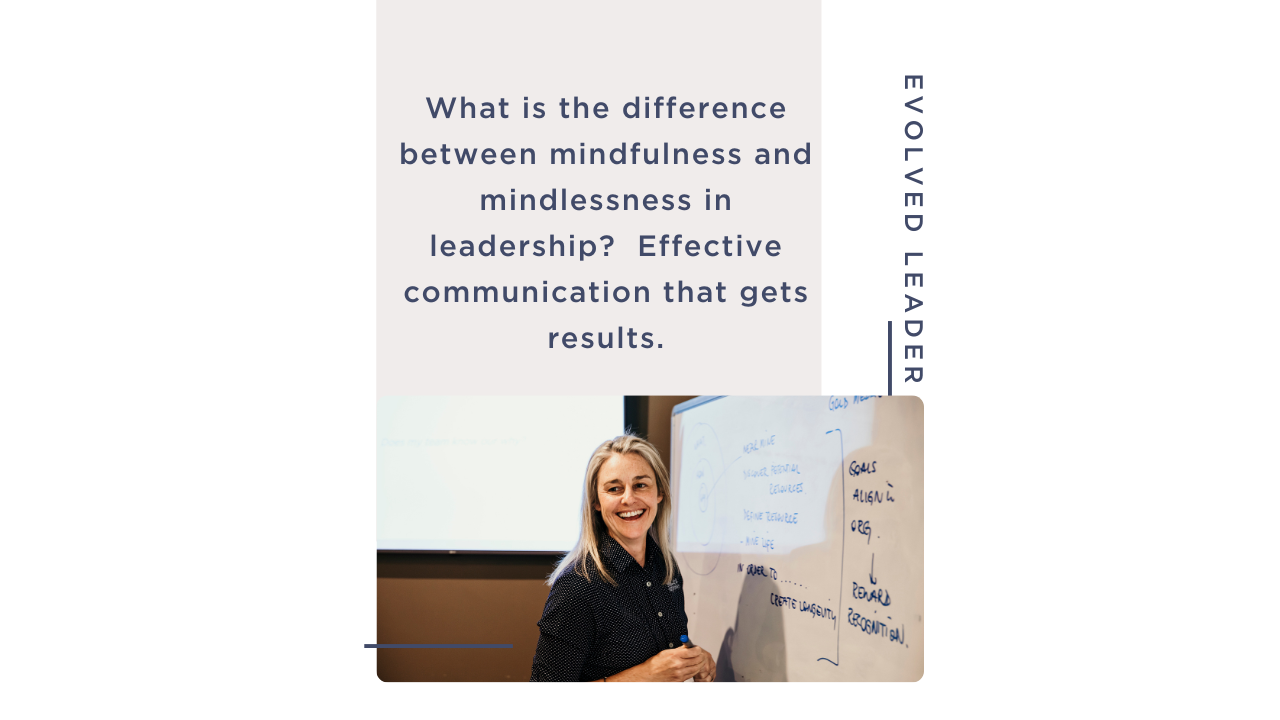Elevate your impact through mindful leadership
Aug 24, 2023
Empathy, emotional intelligence, adaptability, flexibility, great communication, focus and positive impact are all things leaders aim to bring to their day-to-day interactions. What is one skill they all require to achieve maximum impact? Mindfulness.
To bring the right skill to your conversations at the right time you need to be mindful and in the present moment.
When there are constantly competing priorities, its hard to be at the top of your game all the time. This is when we can get caught in the trap of mindlessness. Some of our brains short cuts and patterns can mean we are caught in our own internal thoughts and narratives based on assumptions or our view of the world and leave us missing key insights from a lack of awareness.
The difference between mindfulness or mindlessness as a leader is two contrasting approaches that can significantly impact your effectiveness and your interactions with your team.
Mindfulness in leadership refers to the practice of being fully present, aware, and intentional in one's thoughts, actions, and interactions. Mindful leaders:
- are conscious of their decisions, emotions, and the impact of their behavior.
- are focused on the task at hand and engage fully in conversations and activities. Leaders with strong emotional regulation are able to manage emotions effectively, choosing how to respond rather than reacting,
- actively listen and seek to understand the perspectives and feelings of others, leading to better communication and stronger relationships,
- make well-informed decisions by considering multiple viewpoints and thinking critically, leading to better outcomes,
- approach challenges with an open mind, adapting to change and finding creative solutions,
- foster a supportive work environment that values well-being, collaboration, and growth.
On the other hand mindlessness refers to a lack of awareness and intention in one's actions and interactions. Mindless leaders may operate on autopilot, unaware of the impact of their behaviour and decisions. Mindless leaders:
- may be distracted or preoccupied, leading to missed opportunities and poor communication,
- react emotionally without considering the consequences, leading to misunderstandings and conflicts,
- not actively listen or may fail to communicate effectively, hindering team collaboration and understanding,
- make decisions made without thoughtful consideration which can lead to poor outcomes and damage to team morale,
- struggle to manage stress, potentially leading to burnout,
- can resist change due to a lack of adaptability and an unwillingness to consider new perspectives,
- contribute to an environment marked by confusion, lack of direction, and reduced employee engagement.
When you look at these lists, what behaviours might start to creep in for you when you are overwhelmed or feel your load is beyond your capacity?
Recognising your behaviours is a great first step in becoming more mindful. When you recognise mindlessness, here are some simple things you can do:
- focus on bringing active listening to your conversations by giving people your full attention, maintain eye contact, and refrain from distractions or interrupting,
- Think about how you want to show up in each interaction and make an effort to be fully present throughout the day. Whether you're in a meeting, working on a project, or interacting with colleagues, give your self some guidelines on what being mindful looks like for you,
- Bring mindfulness to your breaks. Set aside a few minutes to close your eyes, take a few deep breaths, and centre yourself. This can help you recharge and stay focused,
- Make time for regular mindful reflection, jot down some points about your leadership experiences, challenges, and successes. This can help you gain insights into your leadership style and track progress,
- Set boundaries with technology during and after work hours. Have cut off times to check emails and messages and avoid constant digital distractions.
Mindfulness in leadership requires conscious presence, self-awareness and emotional regulation, that leads to creating positive outcomes for you and your team.
By cultivating mindfulness you can enhance the effectiveness of your communication and create a more positive work environment that produces results.
Get Evolved Leader delivered to your inbox every week to receive effective tools and practical ideas you can implement to develop your own leadership skills and style as well as those in your team.
We hate SPAM. We will never sell your information, for any reason.


